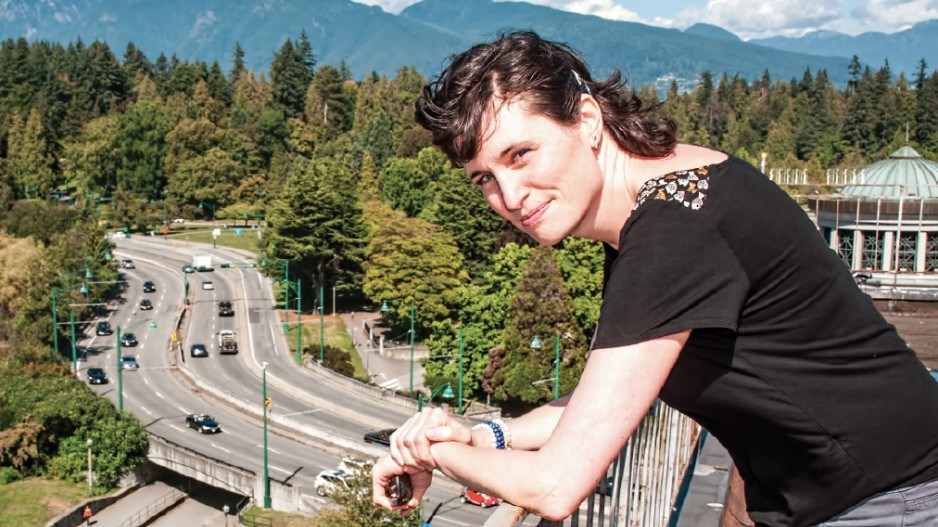Like the sound of a dripping faucet, recent reports of increased car sales in China and Italy as those countries emerged from pandemic lockdowns have been impossible to ignore for people invested in shared transportation.
“And quite frankly, the group was concerned around that,” Sandra Phillips, CEO of Vancouver-based Movmi Shared Transportation Services Inc. and a member of its COVID-19 Shared Mobility Taskforce.
Movmi designs and implements multi-mobility networks that include car and bike sharing, so rising post-lockdown car sales were understandably worrisome. Would efforts to wean commuters off single-occupancy vehicles falter as locals avoid crowded buses or rapid-transit systems for health reasons?
“We decided we wanted to understand from consumers directly,” Phillips said.
An August report commissioned by the global task force and co-authored by Phillips examined the effects of the pandemic on Metro Vancouverites’ transportation habits as more residents embarked on working from home while others modified their commutes when returning to the workplace.
Survey results from the report, meant to represent a snapshot of behaviour in Metro Vancouver from June 10 to July 5, concluded that people in 14% of car-free homes in Vancouver were now considering buying a vehicle.
“Fourteen per cent is actually quite low compared to the numbers that have come out of Milan or China,” Phillips said.
In China, sales of passenger vehicles grew 16.4% year-over-year in July to 2.11 million vehicles, according to figures released last month from the China Association of Automobile Manufacturers.
Numbers in Italy reflect much less enthusiasm than in China, with light vehicle sales falling 10.8% that same month compared with a year earlier, according to the Italian Association of the Automotive Industry (ANFIA).
But a May survey from Capgemini SE consultancy revealed that 43% of Italians were considering buying a car this year – the third-largest proportion among countries surveyed, behind China (61%) and India (57%).
Phillips speculates the difference between those countries and Vancouver may be the degree to which the jurisdictions were hit by COVID-19 at the outset of the crisis.
Cycling increased 2% across Metro Vancouver, according to the task force’s survey, and Phillips said it remains unclear how much these figures will change as the weather gets colder in the coming months.
Google’s (Nasdaq:GOOGL) COVID-19 community mobility report on the city of Vancouver found transit ridership fell 47% below pre-COVID levels from June 15 to July 27.
Just over 71% of task force survey respondents reported reducing the number of trips they take across Metro Vancouver, and another 17% of respondents reported not travelling at all.
The report attributed a significant proportion of that shift to a rise in the number of respondents now working from home: 13% prior to the pandemic, compared with 75% at the time the survey was conducted.
“If we’re thinking 14% are going to buy a vehicle, which is now less used [due to remote working], I always think it’s a waste of space just having these vehicles sitting around,” Phillips said.
“Once you’ve got that you’re locked into that mode for, let’s just say, the next five to 10 years.”
Phillips said after that investment is made, it’s unlikely that those formerly car-free homes will go back to depending on car-share memberships, consistent transit use or cycling.
Metro Vancouver’s brief flirtation with regulated ride-hailing also took a hit as the number of trips plunged throughout the region in the immediate aftermath of the pandemic, according to Lyft Inc. (Nasdaq:LYFT).
Since then, the ride-hailing service reported, rides to Vancouver International Airport have remained low, but rides to ferry terminals and public transportation hubs have exceeded numbers posted during the brief, pre-pandemic period between Lyft’s January launch in B.C. and the lockdown that followed in March.
One of the ongoing issues facing the launch of ride hailing in B.C. is the requirement for drivers to obtain Class 4 commercial licences.
The problem was further exacerbated during the pandemic when the Insurance Corp. of B.C. (ICBC) suspended road tests over safety concerns, according to Jamil Chaudhry, director of operations for ReRyde Technologies Inc.
The Richmond-based ride-hailing service is among the more than a dozen B.C. operators now aiming to compete with giants like Lyft and Uber Technologies Inc. (NYSE:UBER).
“When we were choosing which market to entertain, we noticed there was a huge gap,” Chaudhry said, referring to Uber and Lyft offering services only within the Lower Mainland.
“Companies are rushing towards one area. One reason’s for sure: everyone is looking to cater to the community with the higher population.”
He said ReRyde will instead be focused on the Capital Regional District, the rest of Vancouver Island, the Okanagan and northern B.C.
But getting operations off the ground with a sufficient number of drivers has been challenging for ReRyde due to the lower population density of those regions and the lack of road tests (ICBC resumes road tests September 9).
The company is now offering $500 bonuses to applicants who become drivers.
Victoria-based LTG Technologies Ltd. (Lucky to Go) began offering services in Kelowna in July but its CEO, Mandeep Rana, said it was possible to do so only by recruiting taxi drivers who already possessed a Class 4 licence.
Chaudhry said the company is doing the same but it has taken a big hit as a result of the pandemic.
He still hopes services will be ready to launch in 30 to 60 days.
“It is going to be a struggle, just because of how things are working right now,” he said. •




